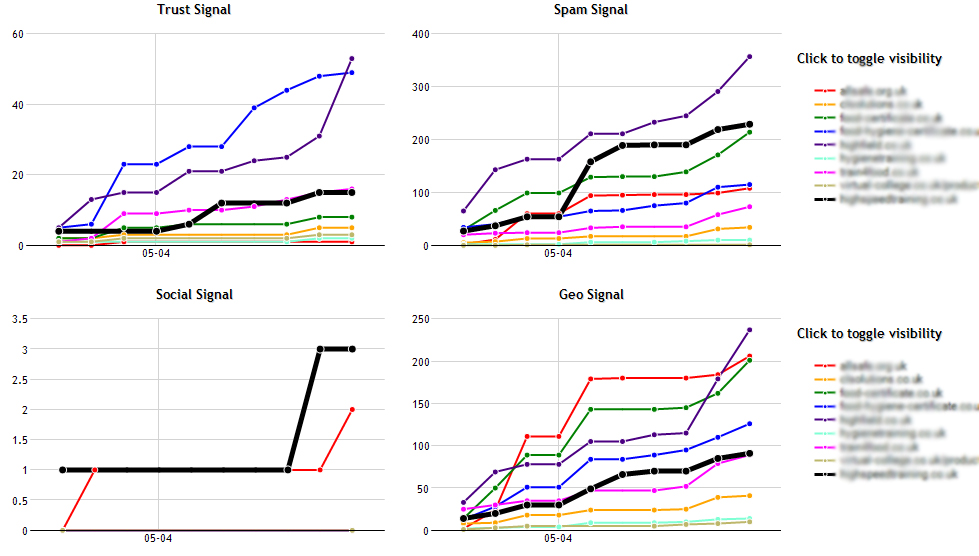A couple of the more widely used terms in SEO circles are “high trust links”, aka “trusted links”, and “authority links”. As often as these terms are used and written about, you’d think there would be agreement as to what the terms actually mean. That said, I dare you to find a consensus or “universal definition” for any of them.
 It’s often a matter of context. If the discussion is centered on obtaining higher search engine rankings, then the terms trust or authority have a meaning that is all about organic search results, or more simply put, ranking higher. Get more high trust links, and you get better rankings, right? Usually, but then again, not always. The devil is always in the details. A bunch of new high trust links wont do much to help a site that’s been link spamming for ten years.
It’s often a matter of context. If the discussion is centered on obtaining higher search engine rankings, then the terms trust or authority have a meaning that is all about organic search results, or more simply put, ranking higher. Get more high trust links, and you get better rankings, right? Usually, but then again, not always. The devil is always in the details. A bunch of new high trust links wont do much to help a site that’s been link spamming for ten years.
If the discussion is centered around click traffic, then high trust or authority can mean something different. In this context the meaning is more about the writer/author of the target site itself. A highly regarded journalist who chooses to write about you and links to your web site compared to a casual blogger who will gladly take money to write about and link to your site. Adding to the confusion, not all high trust links provide organic search rank benefit, and some paid links can in fact sometimes have a positive impact on rank without violating a search engine’s quality guidelines.
As with most of my articles, and example is sometimes worth a thousand words, so let’s try one. When I start a new project involving link building, promotion, or content publicity, I begin with research. I’m interested in identifying not just competing sites, but other sites within any industry vertical that make up the “core” content universe for any given subject. My tool of choice for backlink research is Link Insight.
When I study backlinks to the sites that make up the core universe in any topic, trusted sources begin to emerge in my data. How? Because these sites are often (though not always) the sites that are linking to the best sites from the topic’s core. In more simple terms, the sites and people that have already shown an interest in the topic of the site I’m building links for and have created a link resource list, located on an already trustworthy site. I have a series of signals or link signal types I’m looking for to help me spot them.
Here’s my favorite example. Let’s say that you and I are passionate about blues music, and we have created a web site devoted to blues music, like this one called The Blues Database. (example only, no affiliation). There are plenty of fairly well known if not standard methodologies for identifying link trusted targets.
One of the more common is a simple search like this one, a Google search for blues links submit
There are a hundred variations on this. You can even look for sites actively seeking link submissions via an advanced search such as music blues intitle:submit URL. But aside from these easier tactics, I like to dig a little deeper.
My background is in both business and information science, with a couple years of graduate studies in Library Science. So, I look to see if any professional researchers or librarians have already taken the time to aggregate, compile, or “curate” if you will, a link guide in that topic. Why? Because if they have, given their expertise and ability to identify the highest quality content on the web, then they have also helped point me towards the highest quality sites for potential link seeking.
So I begin with a new search, like this one top sites for researching blues music. Among our results is an old article from Information Today magazine online. Here’s a page with Blues Music links from the Jefferson County Public Library.
One common link each of the two examples share is each links to a site called Blues Music from PBS. When I visit that site, I see they have a section with blues music resources/links page.
Would you agree with my assumption that if we were able to obtain a link for the site I mentioned earlier, The Blues Database from that PBS Blues resources/links page it would be a trusted link?
There are a couple other key things to note here. First, that page at PBS.org is not a random list with 435 links to sites on any topic. It contains just a handful of links, selected by editors who had a reason for selecting them. Second, because there are only a handful of links on the page, getting a link from that page wont be easy and this is the heart of the trust.
This is why search engines value this type of “curated” links section and it follows that this is also why you would want a link from that PBS site.
Now for the moment lets pretend we are Google. When you crawl that page devoted to blues music on the PBS web site and find a collection of links to other blues sites, what are we going to do? We are going to give organic search reward to sites have shown, by merit, to be worthy of a that link.
My example above works in hundreds of verticals about thousands of topics.
Somewhere online, maybe out in the nooks and crannies of the web, are people who have taken the time to cull and create selective link collections.
For those of you with meritorious content about one of those topics, if you can identify these targets and earn a link, the result is a double win. You get additional targeted traffic, and improved search rank.
Bio – Eric Ward, Link Evangelist, Adgooroo
Eric Ward has been involved in online marketing since 1993, and is recognized as the web’s foremost expert on content linking strategies. Eric founded the first Web-based public relations and web promotion services, called NetPOST and URLwire, in 1994. Today, Eric as the Link Evangelist at Adgooroo, Eric helped create Link Insight, a powerful tool that helps companies identify and improve their link profiles.
In addition, Eric writes the LinkWeek column for industry news site SearchEngineLand.com, and writes or has written for Web Marketing Today, ClickZ, MarketingProfs, and Ad Age Magazine. Eric is a highly rated speaker at web industry conferences. Eric’s clients include PBS.org, WarnerBros, The Discovery Channel, National Geographic, TVGuide.com, and Weather.com. In 2009 Eric was one of 25 people profiled in the book Online Marketing Heroes from Wiley and Sons.
Eric resides in Florida with wife Melissa and boys Noah (8), and Abram (3).


We are currently experimenting with Link Insight as following the spammers is just not for us. It’s early days so I can’t report any great success or failure but at the price I’m hoping it works!
I only hope the engines are doing their bit because I know I’m not alone when I say it’s soul destroying following ethical routes when the spam is working so well, it’s also tough explaining to clients why they should pay is £x 000’s instead of $much cheapness for 100 links.
d
Great, one more self promoting post by Eric Ward.
hey, its not self-promoting actually. we invited him to give us his ideas.
” My tool of choice for backlink research is Link Insight. ” - Probably because he takes a slice of the profits?
I doubt that Eric needs to do any self-promoting as he is THE most recommended expert on link building I have ever come across. Ask any SEO or Internet Marketer who is best on the subject and his name WILL come up.
I would like to share something with both you and Eric that makes building a niche network in CommentLuv blogs an even stronger link building strategy. I linked this comment to a post that explains what we’re doing and how it will benefit small businesses.
One of these days I hope to official “meet” Eric online. I’ve been reading his strategies and hearing about him for so many years now.
I do not receive a slice of the profits. I helped create it and now work for Adgooroo to continue to improve it. Someday, if we reach certain goals, I have a chance to make money from Link Insight. But you are naive if you think that’s why it’s my tool of choice. I’ve been offered deals for link building tools for over a decade. Yes, a decade. And I’ve turned them all down because none would adhere to my conervative white hat model. I would not attach my name to anything that would not help you. That’s not how I work, and exactly why I stayed a one person operation for 15 years. If you want to question my motivations, come at me one to one, clown.